We’ve all heard sayings about cats, but have you ever wondered where some of these common phrases come from? From “curiosity killed the cat” to “the cat’s meow,” there are a lot of fun idioms that refer to cats.
Cats have long been a part of human lives, with the first domestic cats appearing around 10,000 to 12,000 years ago, so we’ve had plenty of time to come up with lots of fun phrases about cats!
The 11 Cat Idioms & Sayings with Meanings
1. Curiosity Killed the Cat

We’ve all heard this phrase, and it obviously refers to the highly curious nature of cats. Cats also seem to always be getting up to some kind of mischief. This phrase refers to the risk of being overly curious or prying into things that aren’t your business, which can lead to you learning or seeing something that you don’t want to.
Origin: This phrase may not be as old as you’d think. It appeared in The Handbook of Proverbs: English, Scottish, Irish, American, Shakespearean, and scriptural; and family mottoes, released in 1873. It’s believed that this phrase originated in Ireland and was an updated version of an older idiom, “care killed the cat,” which you may see pop up in Shakespearean works.
2. The Cat’s Meow/The Cat’s Pajamas
If something is the cat’s meow or the cat’s pajamas, then it’s something that’s popular or excellent. This is a fun way of saying, “Well, that’s great!” It’s the feline equivalent of saying something is “the bee’s knees.”
Origin: In the 1920s, an American journalist and cartoonist by the name of Thomas Dorgan coined this phrase. You can also thank Mr. Dorgan for phrases like, “for crying out loud!” and calling a dumb person a “dumbbell.”
3. Cat Got Your Tongue?
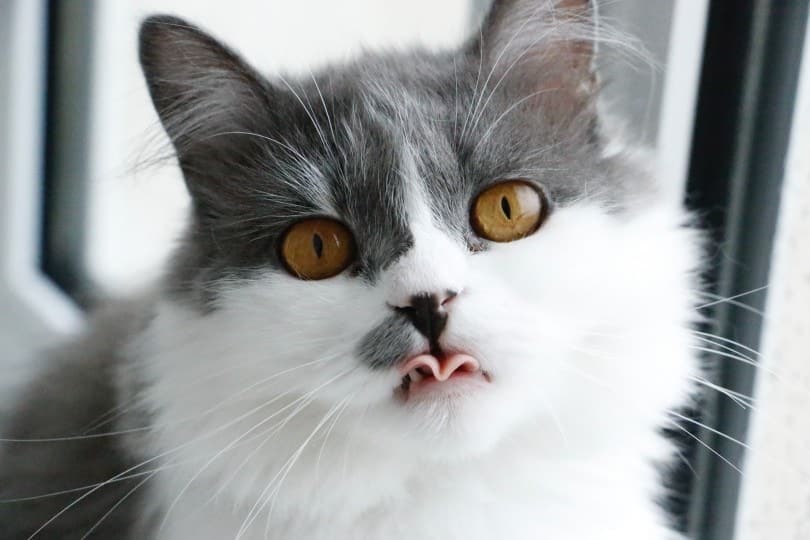
This popular cat idiom refers to the inability to speak—usually because you’re unable or unwilling to answer a question or you’ve been caught off guard by something that was said.
Origin: Although very popular, the origin of this phrase is somewhat mysterious. Some claim that it originated in ancient Egypt or other ancient civilizations that cut people’s tongues out as a form of punishment. It also may have originated during the Middle Ages when people’s fear of witchcraft was at an all-time high, leading some to believe that a feline familiar of a witch could cause your tongue to be paralyzed, leaving you unable to speak.
4. Let the Cat Out of the Bag
If you’ve “let the cat out of the bag,” then you’ve revealed a secret—likely one that shouldn’t have been revealed. This phrase playfully refers to how nearly impossible it would be to put an upset cat back into a bag after it escapes from it.
Origin: Like the previous phrase, this phrase has mysterious origins. There’s a possibility that it actually refers to a cat-o’-nine-tails, which is a type of multi-ended whip that was used to punish people. Although this type of punishment existed for thousands of years, some people believe that this phrase may date back to when the British Royal Navy still used this as punishment.
Some believe that this phrase refers to people during the European Renaissance being tricked into thinking they were purchasing livestock, like pigs, inside of a bag and instead being given a cat.
5. Raining Cats and Dogs
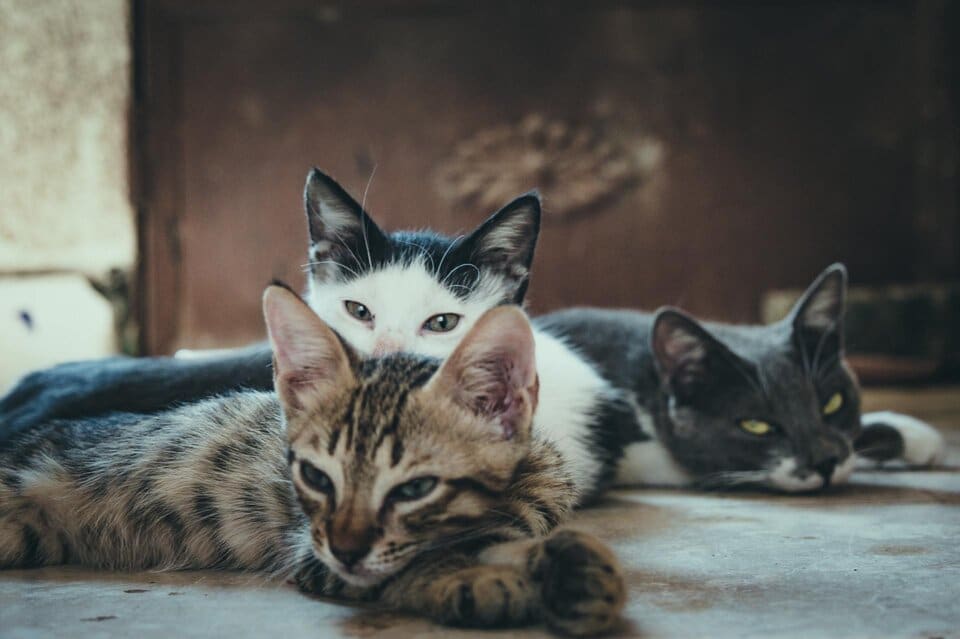
The meaning of this one is simple—it’s raining very heavily outside!
Origin: Once again, the origin of this phrase is not completely clear. It’s generally believed that it refers to 17th-century Europe when heavy rains would often result in everything caught in drainage systems being flushed out. Unfortunately, this often included the corpses of dead animals, including cats and dogs.
6. Scaredy Cat
Someone who is a scaredy cat, or a fraidy cat, is someone who is easily spooked. If you’ve spent much time around cats, you know that they can be jumpy and skittish!
Origin: While the origin of “fraidy cat” is unclear, it was popularized and widely used by 1871. In 1933, Dorothy Parker coined the term “scaredy cat” in her short story titled The Waltz.
7. Look What the Cat Dragged In
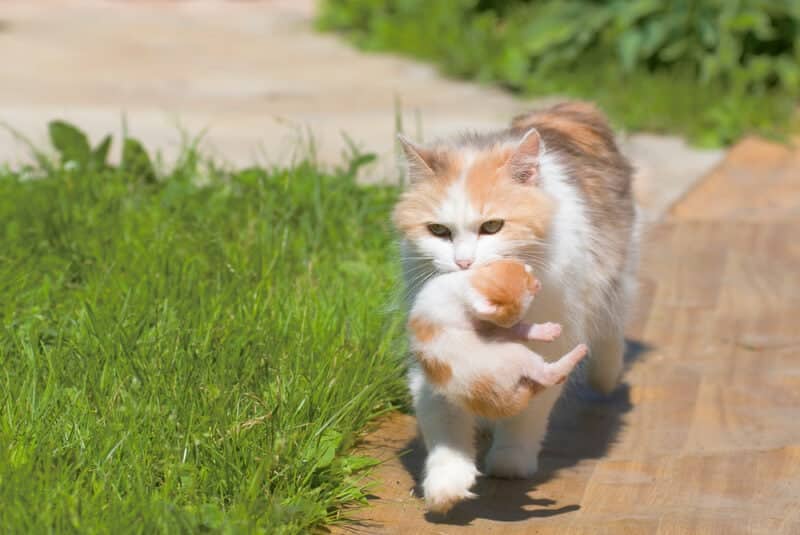
Have you ever shown up to a friend’s house looking a little haggard? They may have said this phrase to you. “Look what the cat dragged in” or “looks like something the cat dragged in” are phrases that refer to someone or something that, to put it plainly, looks pretty rough.
Origin: Although the true origin of this phrase is unknown, it is known that it appeared in The Perrysburg Journal newspaper and Harper’s Bazaar magazine in 1877.
8. While the Cat’s Away, the Mice Will Play
Cats are sometimes kept for their ability to help control pests, like mice. This phrase playfully refers to mice feeling safe to come out when they know a cat isn’t around. It’s used when an authority figure, whether it’s a boss, parent, or teacher, is away, leaving the people to have a little bit of fun.
Origin: This phrase was popularized by the 1600s, although its origin is not known. In 1607, English author Thomas Heywood used the phrase in his book, A Woman Kill’d With Kindness.
9. As Nervous as a Cat in a Room Full of Rocking Chairs
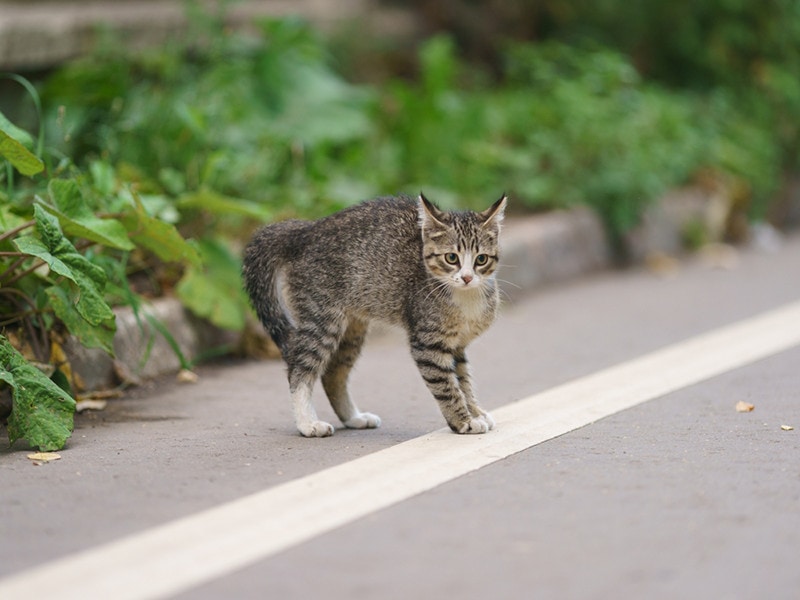
You may also see this phrase worded as, “As nervous as a long-tailed cat in a room full of rocking chairs.” Imagine how you’d feel if you were a cat in a room full of chairs rocking all over the place. If you had a long tail, you’d have to keep it close to make sure it didn’t get squished! This idiom refers to someone being extremely nervous.
Origin: In 1953, this phrase was used in a newspaper column as part of the phrase, “Next to living on the side of a volcano, the most hazardous existence we can think of is that of a long-tailed cat in a house full of rocking chairs.” In 1956, Tennessee Ernie Ford, an American singer and television host, used the phrase, which popularized it in the American South.
10. Like the Cat that Ate the Canary
Have you ever noticed someone seeming especially smug? Then they probably look like the cat that ate the canary. This idiom refers to a cat managing to get a canary from its cage and eat it, leaving them feeling pretty smug afterward.
Origin: The Milwaukee Journal used this phrase to describe a politician in 1911, making it one of the younger cat idioms on the list. There’s also a British version of this idiom—“like the cat that got the cream.”
11. Herding Cats
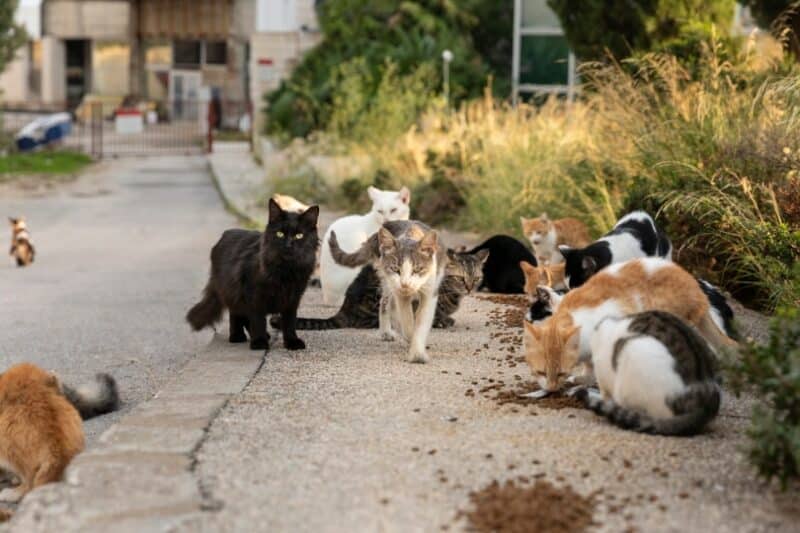
If you’re herding cats, then you’re in a chaotic situation that’s difficult to control. Obviously, attempting to herd a group of cats would be next to impossible!
Origin: This may be the youngest phrase on the list, believed to have only shown up in 1979. Monty Python used this phrase in the opening scene of the movie, The Life of Brian, which was released in 1979.
Conclusion
These are some of the most common cat-related phrases and idioms that you might hear in your day-to-day life, but there are many more out there! Cats have been a popular topic of conversation for thousands of years, in both positive and negative situations. Whether the phrase is related to witchcraft or humor, you shouldn’t run out of cat-related idioms to use anytime soon!
Featured Image Credit: Juliya Shangarey, Shutterstock
Contents
- The 11 Cat Idioms & Sayings with Meanings
- 1. Curiosity Killed the Cat
- 2. The Cat’s Meow/The Cat’s Pajamas
- 3. Cat Got Your Tongue?
- 4. Let the Cat Out of the Bag
- 5. Raining Cats and Dogs
- 6. Scaredy Cat
- 7. Look What the Cat Dragged In
- 8. While the Cat’s Away, the Mice Will Play
- 9. As Nervous as a Cat in a Room Full of Rocking Chairs
- 10. Like the Cat that Ate the Canary
- 11. Herding Cats
- Conclusion











